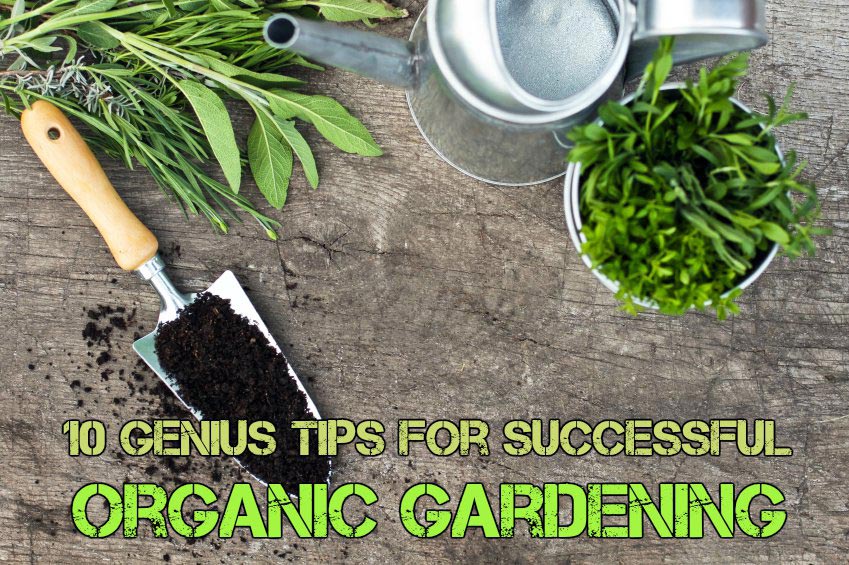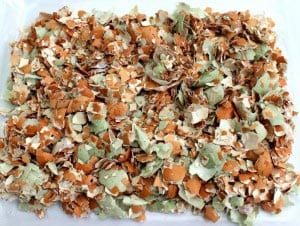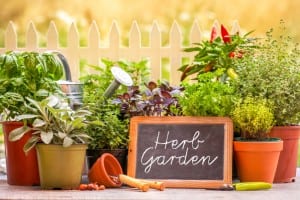
Eating healthy doesn’t have to mean buying expensive organic produce from that one big store in town with the exorbitant prices; nor should it mean crossing your fingers in hopes that your local grocer will have something good in the tiny organic section of its produce department.
Save yourself some money and the headache of hunting for fresh, healthy foods by following these 10 tips to successfully grow your very own container, patio, or old-fashioned-in-the-dirt organic garden!
1. Easy Seed Starting
Before you head out to your local home and garden store to pick up those expensive seed starters, take a look around your home for some free alternatives. You can up-cycle everyday items like citrus peels, egg shells, old newspapers, and even empty K-cup containers to give your seedlings a comfy place to sprout.
Check out our 10 Creative Seed Starting Ideas to learn more great tips and get your garden growing!
2. Get To Know Your Fertilizers
Few things are more important to growing a successful organic garden than choosing the right food and the proper balance of nutrients for your plants. When it comes to organic fertilizers, there are a lot of options – many of which you may have never heard of. From basics like composting and grass clipping tea to less obvious fertilizers such as Epsom salt and vinegar, these 10 Tips & Recipes For The World’s Best Homemade Organic Fertilizer have got you covered.
Further Reading: Composting 101: How To Create Compost That Works Like Rocket Fuel For Your Garden
3. Recycle Your Eggshells
 Eggs aren’t just the perfect food for people. Plants love them too! Instead of throwing away the shells the next time you cook eggs, feed them to your plants. Learn all about cleaning and preparing shells for use in the garden, which plants benefit most from the nutrients they provide, and more great tips for up-cycling in this post: 6 Convincing Reasons You Should Start Using Eggshells In Your Garden
Eggs aren’t just the perfect food for people. Plants love them too! Instead of throwing away the shells the next time you cook eggs, feed them to your plants. Learn all about cleaning and preparing shells for use in the garden, which plants benefit most from the nutrients they provide, and more great tips for up-cycling in this post: 6 Convincing Reasons You Should Start Using Eggshells In Your Garden
4. Just Add Salt (Epsom, That Is)
If you’re no stranger to natural living, you’ve probably already heard of our 20 Mind Blowing Reasons Why Epsom Salt Should Be In Every Home, but did you know that this incredible natural mineral is also a powerful force in the garden? Whether your passion is herbs, fruit, vegetables, or flowers, this is one organic gardening helper that you simply can’t pass up. Learn all about how Epsom salt can help your garden grow from feeding your seedlings and reducing transplant shock to encouraging more plentiful produce and even deterring garden pests in this post: 10 Incredible Uses for Epsom Salt in the Garden!
5. Put Your Essential Oils to Work
Essential oils have a wide variety of physical, mental, and emotional health benefits for the human body. However, it doesn’t have to stop there! Take your collection of oils outside and put them to work in the garden repelling pests, preventing plant diseases, and turning your garden into a relaxing green getaway. Read more in: 9 Clever Ways To Use Essential Oils In The Garden.
6. Get the Most Out of Your Harvest
 Growing your own organic herbs can be a fun and exciting way to improve your health and that of your loved ones. While it is possible to get by with just the basics – sunlight, fertilizer, and water – there are a handful of simple steps which can turn your casual herb garden into a beautiful and bountiful natural health sanctuary! Brush up on your techniques, including the one-third rule, best harvesting times, pruning practices, how to preserve your herbs, and much more with these 11 Tips for Harvesting and Preserving Fresh Herbs.
Growing your own organic herbs can be a fun and exciting way to improve your health and that of your loved ones. While it is possible to get by with just the basics – sunlight, fertilizer, and water – there are a handful of simple steps which can turn your casual herb garden into a beautiful and bountiful natural health sanctuary! Brush up on your techniques, including the one-third rule, best harvesting times, pruning practices, how to preserve your herbs, and much more with these 11 Tips for Harvesting and Preserving Fresh Herbs.
Plus, continue your herbal journey and explore Top 20 Most Under-Rated Healing Herbs You Need To Grow In Your Garden
7. Naturally Manage Weeds
Anyone who has ever tried organic gardening knows that controlling weeds can be a huge pain (literally!) The good news is – there’s an easier way. Before you don your gloves in preparation for an afternoon of tedious pulling, peruse these 8 Natural Ways To Kill Garden Weeds and pick up a few great tips that can save you both time and energy.
8. Creepy Crawly… Cohorts?
For most people, insect pest-control comes in at a close second to weeding when it comes to organic gardening frustrations, but it doesn’t have to be. One of the easiest and most effective ways to keep those six-legged nastiest at bay is to fight fire with fire by introducing natural predators into the mix. Learn how to make friends with a whole host of critters who will not only devour the bad bugs before they can make a meal out of your crops, but also give you a hand (or six) with pollination in the 10 Ways To Attract Beneficial Insects To Your Garden.
9. Control Aphid Populations
Of all of the insects that can destroy a garden, aphids are in a class of their own. Boasting around four thousand different crop-chomping, plant-pulverizing species, aphids are among the most efficient, prominent, and destructive garden pests in the world. With a hard waxy coating that protects them from most organic pesticides and an ultra-fast rate of reproduction, they can also be one of the hardest to get rid of. Prepare yourself and protect your garden with these 12 Organic Ways To Get Rid Of Aphids which include warning signs to look out for, natural repellents to keep them away, removal techniques, and more!
10. Repel Flies and Other Biting Insects
For a lot of us, gardening is an escape and our outdoor spaces are a relaxing haven where we go to unwind. That said, nothing quite spoils the tranquil mood of gardening like a swarm of buzzing, biting, flying insects. Be ready to ward them off and save yourself some frustration this spring and summer by planting a few of these 6 Fragrant Herbs & Plants That Repel Flies in and around your beloved garden. Also be sure to check out these incredibly popular 11 Plants That Repel Mosquitoes and give your fly swatter a break!
